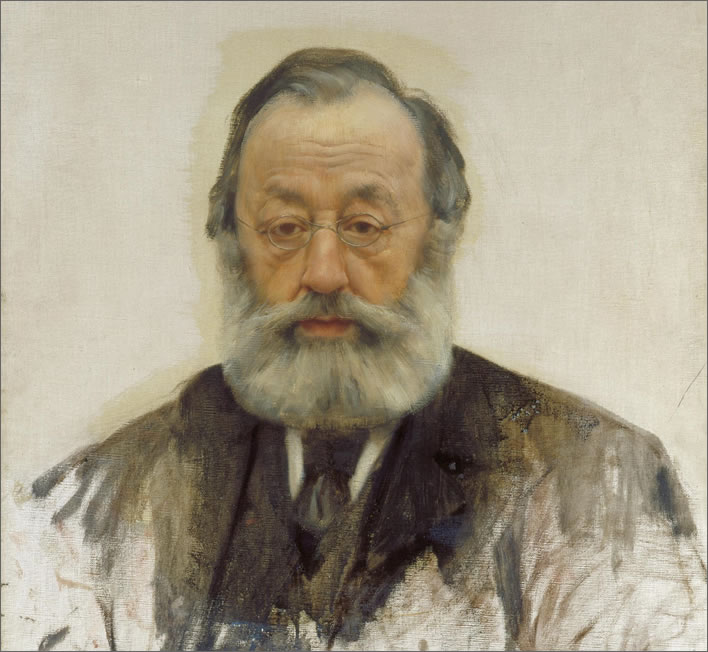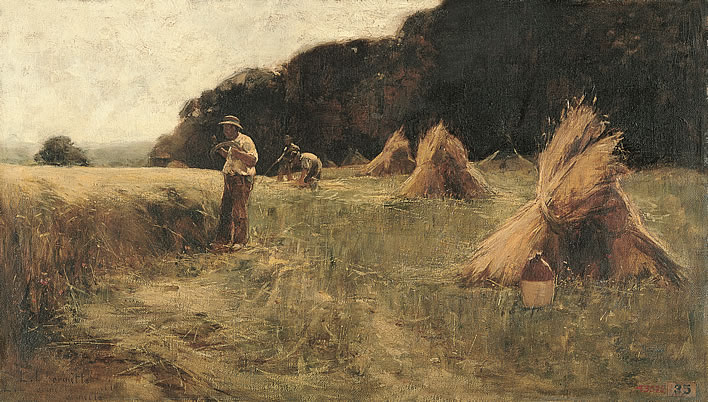Swiss National Day, 1 August
Posted by Richard on UTC 2020-08-01 03:04
To mark Switzerland's Bundesfeier, 'National Day', here is a poem by the Swiss literary master Gottfried Keller (1819-1890). It was first printed in 1847.
Keller achieved great recognition for his prose works; his poetry was considered by his contemporaries as too bitter for the delicate sensibilities of the – mainly female – readership of that age. It is a judgement that has continued into modern times, except for a few poems that have passed into the national consciousness of the German-speaking regions of Switzerland.

Karl Stauffer-Bern, Portrait of Gottfried Keller, 1886. Image: Kunsthaus Zürich, Gottfried Keller-Stiftung, Bundesamt für Kultur, Bern.
One of these poems is Sommernacht, 'Summer night'. It is almost certain to be found in any Swiss poetry anthology in German and it is almost certain that every German-speaking Swiss child has read the poem in school.
The poem is not one of those metrical wonders that people have by heart, but it has been prized down the generations for the quality of the moral message it presents. The message is very Swiss: it encapsulates the idea of local charity and individual sacrifice in the cause of the vulnerable.
Every modern civilised nation acknowledges the contribution which individual charity makes to the wider community, but the secular Swiss nation decouples that from all religious context so that it becomes a good in itself.

Not harvesting by night, but close enough. Léon Augustin Lhermitte (1844-1925), Los segadores / The Harvesters, c1870-80. Image: Museo Thyssen-Bornemisza.
Sommernacht
Es wallt das Korn weit in die Runde
Und wie ein Meer dehnt es sich aus;
Doch liegt auf seinem stillen Grunde
Nicht Seegewürm noch andrer Graus;
Da träumen Blumen nur von Kränzen
Und trinken der Gestirne Schein.
O goldnes Meer, dein friedlich Glänzen
Saugt meine Seele gierig ein!
The corn ripples far and wide and stretches out like a sea; on its silent floor, though, are no slithery creatures from the depths or other horrors; there flowers dream only of garlands and drink the light of stars. O golden sea, your tranquil lustre greedily sucks in my soul.
In meiner Heimat grünen Talen,
Da herrscht ein alter schöner Brauch:
Wann hell die Sommersterne strahlen,
Der Glühwurm schimmert durch den Strauch,
Dann geht ein Flüstern und ein Winken,
Das sich dem Ährenfelde naht,
Da geht ein nächtlich Silberblinken
Von Sicheln durch die goldne Saat.
In the green valleys of my homeland there is a fine old custom: when the summer stars shine brightly and the glow-worms glimmer in the bushes, a whispering and waving approaches the cornfield, there in the night the sickles flash silver through the golden corn.
Das sind die Bursche jung und wacker,
Die sammeln sich im Feld zuhauf
Und suchen den gereiften Acker
Der Witwe oder Waise auf,
Die keines Vaters, keiner Brüder
Und keines Knechtes Hilfe weiß —
Ihr schneiden sie den Segen nieder,
Die reinste Lust ziert ihren Fleiß.
Those are the lads, young and upright, who gather in numbers on the land and choose the ripe field of the widow or the orphan, who has no help from father, brother or labourer — they bring the harvest in for them, the purest pleasure adorns their labour.
Schon sind die Garben fest gebunden
Und rasch in einen Ring gebracht;
Wie lieblich flohn die kurzen Stunden,
Es war ein Spiel in kühler Nacht!
Nun wird geschwärmt und hell gesungen
Im Garbenkreis, bis Morgenluft
Die nimmermüden braunen Jungen
Zur eignen schweren Arbeit ruft.
Soon the sheaves are tied firmly and quickly set up in a ring; how pleasantly the short hours passed, it was like a game in the cool night! Now the boys relax and sing brightly within the circle of the sheaves, until the morning air calls the untiring bronzed youths to their own hard labours.
German text from Gottfried Keller, Sämtliche Werke, herausgegeben von Jonas Fränkel und Carl Helbling. 24 Bande. Erlenbach/Zürich/Bern, Band 1, Gesammelte Gedichte, 1931, p. 20f. Translation @FoS (reuse with only with link).
Readers will have surely been struck by the dominant image of the final stanza: the circle formed by the sheaves of corn. There is no practical reason for the harvesters to set up the sheaves in a ring – in fact it would require a little more effort from them to do this.
This consideration alone suggests to us that the circle of sheaves has a metaphorical rather than a practical meaning in the poem. Once we realise this, the metaphors of the ring which binds and the circle which encloses and protects require no long explanation.
But the setting out of the ring is reminiscent of the rituals of some ancient rite. 'Pleasure is now had', Nun wird geschwärmt, and the 'bright singing' during the dark vigil until the coming of the morning breeze remind us of magical, quasi-Dionysian practices.
The event is, after all, ein alter Brauch, 'an ancient custom or practice'. The metaphorically-minded reader will find the presence of Ceres in the hayfield and Bacchus in the singing and pleasure-taking irresistably stimulating and wonder only where their constant companion, Venus, is hiding – but those musings are more than this poem can really support.
Some earlier accounts of this custom certainly take an erotic, more self-interested path: sometimes the boys performed this nocturnal labour for the girls they loved, or for the most beautiful girl in the village, or, as Keller himself had it in the first draft of his poem for 'the poorest girl in the village'.
However, having thus added his own initial twist of social concern, when it came to the print edition Keller took out the erotic component entirely by making the beneficiaries the Witwe oder Waise, 'widow or orphan', thus presenting us with the idea of the selfless act of social charity which we have today. Never trust poets: they are all fantasists and card-sharps, who make it up as they go along.
Within this magical crop circle the young men can relax and amuse themselves; invigorated by its noble purpose, their labour was not the 'hard labour' of normal working life but a refreshment, worth doing for itself. The charitable 'old custom' binds and protects the local community, in that it defends its most vulnerable members. Everyone is, as it were, in it together.
0 Comments UTC Loaded:
Input rules for comments: No HTML, no images. Comments can be nested to a depth of eight. Surround a long quotation with curly braces: {blockquote}. Well-formed URLs will be rendered as links automatically. Do not click on links unless you are confident that they are safe. You have been warned!